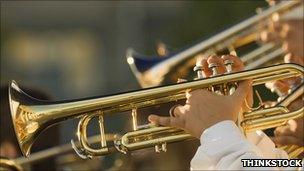School music lessons in Wales cut by ôÈ500k since report
- Published

There are wide variations in music lessons from county to county
At least ôÈ500,000 has been cut from school music lessons in Wales since a report called for a better service.
While extra-curricular music lessons are still free in some counties, others charge or are considering doing so.
It is claimed the number of children reaching youth orchestra standard is "declining at an alarming rate".
The Welsh Assembly Government said it was funding new initiatives, but delivery of lessons was down to individual schools and councils.
In 2006, a host of music stars including Bryn Terfel, Katherine Jenkins and rock band Super Furry Animals, wrote to former First Minister Rhodri Morgan, urging an end to the "postcode lottery" for provision of young people's music lessons outside the curriculum.
To coincide with ǵüµÇ¨û§ Radio Wales' Music Day, ǵüµÇ¨û§ Wales has asked each council about the services on offer.
The results show wide variations from county to county.
Flintshire council is cutting ôÈ177,000 from its budget for instrumental music teaching, which means it will no longer support the county youth brass band or a singing project for 2,500 primary school children.
Carmarthenshire council is reducing its budget by ôÈ120,000.
Powys is the only county that offers no council-funded music lessons at all.
The authority's music director Helen Wilding Smith said: "Provision for learning certain instruments is patchy or non-existent.
"As a result, the number of children reaching youth orchestra standard is declining at an alarming rate."
In Powys, many parents must pay the full cost of lessons, which varies from ôÈ10 to ôÈ26 per hour.
While instrumental lessons are still free in Conwy and Bridgend, Carmarthenshire and Pembrokeshire are considering introducing charges in the near future.
Meanwhile, parents in Cardiff and the Vale of Glamorgan face a 7% increase in the cost of instrumental lessons this year.
"Less inclusive"
Emyr Wynne Jones, who is in charge of school music services in Carmarthen, chaired the assembly government's review which was published last year.
It found music service provision across Wales varied greatly in terms of range, take-up and affordability.
He said the cuts would mean "massive implications for schools".
"The danger with these things is that to keep the provision going we're going to have to begin increasing charges which by default is going to make events such as this more elitist and less inclusive," he said.
"The review identified an awful lot of good practice across Wales but it also identified circumstances that were deteriorating.
"The situation has deteriorated further and continues to deteriorate year on year.
"County councils and music services and friends and parents' associations are doing all they can to make sure the rich musical heritage we have here in Wales continues for many years to come.
"But unfortunately having a rich musical heritage doesn't necessarily guarantee a bright musical future."
The assembly government accepted most of the recommendations of the music services review.
A spokesperson said the development of musical skills was "firmly embedded in the foundation phase and all pupils from the age of seven to 14 years have opportunities to compose and perform music".
They added: "Delivery of the curriculum and extra curricular activities are very much a matter for schools working with partners and, in particular, the local authority-funded music services."
They said the assembly government was committed to raising the profile of music in schools and one example was its "can sing" initiative, promoting singing in primary schools backed up by ôÈ476,000 over three years.
- Published19 November 2010